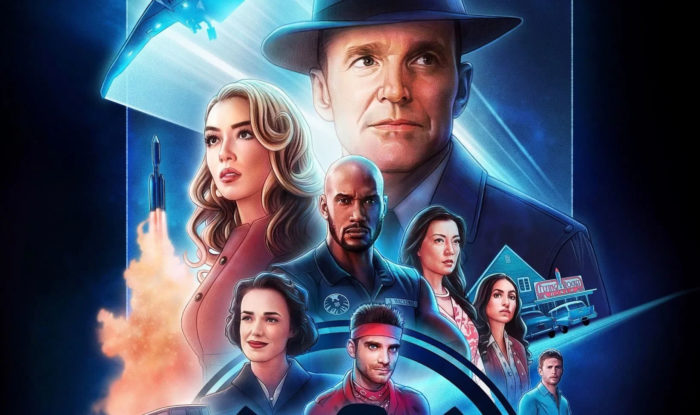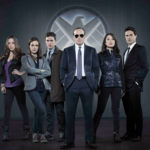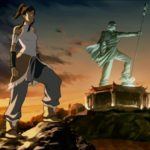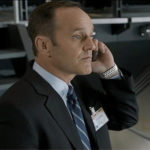The Enduring Legacy of Marvel’s Agents of S.H.I.E.L.D.
It’s almost a miracle that Marvel’s Agents of S.H.I.E.L.D. is returning for a seventh season on May 27. A little over a year after The Avengers brought together “Earth’s mightiest heroes” in 2012, cementing the launch of the Marvel Cinematic Universe that had begun in 2008, this little show began as an attempt to give fans a low-level look at the more mundane goings-on in the vaunted world the movies had established.
Even though the show debuted to much fanfare, its ratings and viewership have declined consistently over the six seasons it has been on the air. It pains me to point this out because the best way I can describe Agents of S.H.I.E.L.D. is to say that the show is home for me. The world of S.H.I.E.L.D. is a place in which I am comfortable existing. It is a place I enjoy returning to again and again despite ever-present threats and danger. In that sense, it is on a level with the Narnia books, the Lord of the Rings movies, and the Dark Knight Trilogy—at least in my head. I never tire of spending time in a story in which skilled agents are “holding the line between the world and the much weirder world.”
I think that I am not alone. Despite steadily declining viewership numbers, Agents of S.H.I.E.L.D. has a fiercely loyal following which has placed it in the top 0.03 percent of TV shows based on fan interaction with the show’s brand online—making it more popular than any of Marvel’s Netflix shows and most of DC’s television offerings. Despite its perceived disadvantages—inconsistent tie-ins to the larger MCU and never landing an appearance with any of the Avengers on air—Agents of S.H.I.E.L.D. is the little show that could. And, as its storyline finally draws to a close (at least for now), I’ve been thinking about its enduring legacy and why the show persists.
It began with a resurrected man
He first turns up in 2008’s Iron Man as the earnest and slightly annoying “Phil Coulson, Agent of S.H.I.E.L.D.” As he spends a few months helping Nick Fury investigate extra-normal phenomena and slowly enticing prospects to join an elite team, Coulson becomes a key player in the Avengers Initiative. That is until he is unceremoniously assassinated by Loki who stabs him through the heart with his Scepter. Director Fury is shaken by Coulson’s demise, but he attempts to use the humble agent’s death to motivate the would-be Avengers who are still struggling to work through interpersonal differences in the face of the Chitauri invasion.
It’s supposed to be the end. Phil Coulson isn’t a hero. He doesn’t have superpowers or regenerative abilities. He is mortal. Human. And humans don’t get to come back. In the grand scheme of the MCU, humans aren’t as valuable as gods, iron men, and super soldiers. Coulson was just another S.H.I.E.L.D. agent struck down in the line of duty. Until he wasn’t.
In his appearances leading up to The Avengers, fans began to feel a special connection with Coulson. He was an everyman in a world of danger and the extraordinary men and women who faced those dangers. He was a man of the people, a man for the people. And when he died, seemingly blinked out of the MCU forever, those people demanded his return.
The “Coulson Lives” fan movement began three days after The Avengers hit theaters. Fans posted #CoulsonLives banners at locations around the globe and promoted the message at comic book conventions throughout the summer. The people’s voice was heard and Marvel announced six months later that Agent Coulson would return in the upcoming Agents of S.H.I.E.L.D.
The “sub-creators” at Marvel reached into the storytelling hat and pulled out a resurrection. Not a cheap sleight-of-hand or rewriting of cinematic history to make us believe that Coulson’s death was somehow faked or otherwise less-than-real. A real, genuine resurrection. Phil Coulson was actually dead. We find out in Season 1 that his doctored S.H.I.E.L.D. file says his heart stopped for eight seconds. However, his doctor later reveals that he was actually dead for several days and Nick Fury “moved heaven and earth” to bring him back.
It is in the resurrection of Phil Coulson that Marvel’s storytelling reaches the level of what Tolkien describes as “Primary Art.” In his essay, “On Fairy Stories,” the beloved creator of Lord of the Rings writes of the Resurrection—of Christ in particular, but of resurrection in all created stories: “There is no tale ever told that men would rather find was true… To reject it leads either to sadness or to wrath.”
Phil Coulson coming back from the dead brought immense joy to the Marvel fandom—an experience which Tolkien says touches something deep inside those who participate in such stories:
The peculiar quality of “joy” in successful Fantasy can be explained as a sudden glimpse of the underlying reality or truth. It is not only a “consolation” for the sorrow of this world, but a satisfaction, and an answer to that question, “Is it true?” The answer to this question that I gave at first was (quite rightly): “If you have built your little world well, yes: it is true in that world.” That is enough for the artist (or the artist part of the artist).1 But in the “eucatastrophe” [a great disaster reversed] we see in a brief vision that the answer may be greater—it may be a far-off gleam or echo of evangelium [good news] in the real world.
With the resurrection of Phil Coulson, Agents of S.H.I.E.L.D. touches a nerve that flows deeply through humanity. But this nerve-touching does not end with Coulson. It is a theme throughout the series. Time and time again, things and people that were dead or thought dead are brought back to life. In the first season, Skye is put on life support after being shot twice in the stomach, and only medicine derived from an alien life-form stitches her broken organs back together. S.H.I.E.L.D. itself is turned inside out, perishing in chaos and bloodshed, and Coulson is tasked with re-forging the organization from the ashes of Hydra. Perhaps the most visible expression of resurrection in the series is the process of Terrigenesis, where unsuspecting individuals are caked in grave-like cocoons and reborn with extraordinary powers.
The series is a living answer to a statement many have uttered at some time: “Things would be all right if so-and-so were here.” It allows us to temporarily inhabit a world in which we would all like to abide forever—a world where there is the possibility of no more death, or at least a world where death can work backwards.
Not just a team, but a family
I’m writing this right after re-watching the thirteenth episode of Season 1. (My plan is to re-watch the entire series before the final season premieres, but I don’t think I’ll make it.) I’ve just seen Skye, orphan-turned-hacker-turned-SHIELD-agent-in-training, bleed out alone in the basement of a mansion in Italy. By the time her team finds her, she has no pulse and is no longer breathing. Even though I know Skye recovers and thrives as an agent for six-plus seasons following this episode, I’m crying.
I’m crying not just because Skye is dying, but because Jemma and Fitz are lost in the face of losing someone they’d come to love. Even the normally stoic Agent May and the steely Grant Ward are on the verge of emotional breakdown; though they easily deal out death, they are useless when Death comes for one of their own. And then there’s Coulson. He’s dead-set on one thing: saving Skye’s life. And he goes to great lengths to do it—disobeying direct orders from S.H.I.E.L.D. HQ, authorizing his team to hack secret files, putting down agents who get in his way, and risking his own life beneath a crumbling mountain.
When a member of his team is in danger or their life is threatened, Coulson becomes blind to everything else. “If Coulson thinks there’s a chance in a million to save Skye,” May tells Ward, “—to save any of us—he’d take it. People like us, we need people like him.”
Coulson’s group of agents isn’t just a team. They’re a family. Their intense loyalty and sacrificial love for each other—their commitment to saving one another again and again and again—their belief that no one they care about is expendable just for the sake of the mission—their readiness to carry each other if need be—reminds me of the Fellowship that came together to take the Ring to Mount Doom.
And, for this S.H.I.E.L.D. team, it is not just the strong who sacrifice. When Jemma realizes that the alien disease she’s contracted and has been unable to find a cure for will kill her and everyone she comes in contact with, she throws herself out of the plane to keep her team—her family—safe. When Ward realizes that S.H.I.E.L.D. HQ has no plans to rescue him and the inexperienced Fitz from hostile territory on a secret mission, he demands that Fitz leave to ensure his safety. But Fitz refuses, insisting that he has to make sure Ward stays safe as well.
This S.H.I.E.L.D. family reminds me of a band of thirteen “friends” who spent three years living together, serving together, grieving together, sacrificing together, and celebrating together (John 15:15). Despite being tasked with protecting the world from dangers unknown, they live by the creed: “Greater love has no one than this, than to lay down one’s life for his friends.”
Marvel’s messiah
Messianic figures litter film, literature, and ancient myth. In Tolkien’s epic alone, Gandalf, Aragorn, and Frodo take on this mantle. At the end of The Dark Knight, Bruce Wayne willingly takes the crimes of others on his own shoulders in order to keep the Joker from “winning” so the faith of the people of Gotham might be rewarded. And there is always Aslan, the son of the Emperor-Over-the-Sea; he is not safe, but he is good.
In the modern myth that is the MCU, there are several who might fit the profile for messiahship. There’s Thor, a literal god who can strike with lightning from the sky. There’s Iron Man who, it could be argued, is the de facto leader of the Avengers in the absence of Nick Fury. There’s Captain America, a decent, stand-up guy who also, in a sense, came back from the dead. I’d even put in a plug for Captain Marvel. But none of these are worthy.
When it comes to messiahship, Phil Coulson fits the bill more than any other character. Not just because he literally rose from the dead, but because he embodies more than any other the qualities of the Messiah of the True Myth: humility, compassion, sacrifice. Coulson has no superpowers. He cannot match May or Ward in hand-to-hand combat. He doesn’t brag. He gets his hands dirty alongside his team. Coulson is not someone you would think of as a leader, much less a messiah.
If there is one word I’d use to describe Coulson, it would be “shepherd.” He genuinely cares for each member of his team on a deep, personal level. They are not just agents; they are his brothers and sisters, and some are his children. He counsels them, comforts them, and cheers them on. He’s tough on them when he has to be. He drives them to be better, and they want to be better because of him—because they know he will risk his life to protect them. Time and time again, Coulson acts as the shepherd spoken of in Jesus’ parable (Luke 15:4-6):
What man of you, having a hundred sheep, if he has lost one of them, does not leave the ninety-nine in the open country, and go after the one that is lost, until he finds it? And when he has found it, he lays it on his shoulders, rejoicing. And when he comes home, he calls together his friends and his neighbors, saying to them, “Rejoice with me, for I have found my sheep that was lost.”
When his little lambs go astray, whether deliberately or by the machinations of others, Coulson does not hesitate to go after them. “I know the value of a thousand men, but I also know my men and what they’re worth,” he tells Victoria Hand after she sends Ward and Fitz into the field without an exit strategy. Phil Coulson, Marvel’s messiah, is “a far-off gleam or echo of evangelium [good news] in the real world.”
Perhaps we don’t deserve a show like Agents of S.H.I.E.L.D—a show that doesn’t rely on cheap suspense, trash humor, and tawdry romantic entanglements to keep our interest. Perhaps it’s for the best that none of the big-league Marvel characters made appearances on the show and that the creators carved out a corner of the MCU to call their own. I know people who have seen all of the Marvel movies, but have not watched Agents of S.H.I.E.L.D. They are missing out. But that is why I’m glad the show reflects Primary Art. It is flush with whispers of the True Myth. And, as such, its legacy will endure.
- And, I might add, enough for the audience beholding the art. ↩











































Agents of Shield never got the love it deserved. This article inspired me to sit down and rewatch the early seasons. The family dynamic is so strong; the show’s not afraid to depend on family, not romantic bonds (which is where the DC shows I’ve watched put their emphasis, and consequentially fall short).
As early as episode 4 of season 1, we have Skye referring to an argument between May and Coulson as “mom and dad fighting.” Then you get lines like “We’re her family” at the trauma center in Zurich…. even the bad guys get it… I spent, like, ten minutes ranting about the scene between Coulson and Cal in Puerto Rico, how Cal sees Coulson as a competitor for the fatherhood role…. just….fatherhood is a surprisingly common theme in Marvel, and Coulson is the star example of a good dad (with Scott Lang as the runner-up).
Consistently my favorite Marvel show. And now that my favorite show of all time (Doctor Who) has become rather terrible with slight glimmers of hope, Agents of Shield is probably my favorite currently airing show. I’ve watched it from day one, and it’s one of the few shows I made sure to watch each week before new episodes came out. Sorry to see it go, but glad they are ending it well, with plenty of advance warning to make this final season its best.
This article made my day! And I agree with so much of it – S.H.I.E.L.D. definitely feels like home, a lot more than many of the movies in the MCU ever will. It’s absolutely golden.